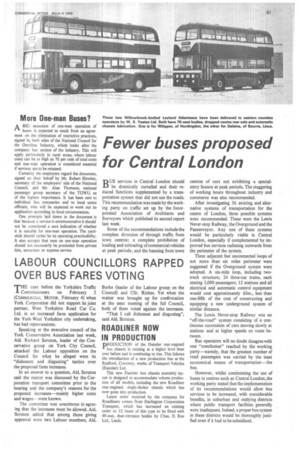Fewer buses proposed for Central London
Page 63

If you've noticed an error in this article please click here to report it so we can fix it.
D US services in Central London should
be drastically curtailed and their reduced functions supplemented by a transportation system that did not use the roads. This recommendation was made by the working party on traffic set up by the Incorporated Association of Architects and Surveyors which published its second report last week.
Some of the recommendations include the complete diversion of through traffic from town centres: a complete prohibition of loading and unloading of commercial vehicles at peak periods; and the banning from town centres of cars not exhibiting a specialentry licence at peak periods. The staggering of working hours throughout industry and commerce was also recommended.
After investigating 36 existing and alternative systems of transportation for the centre of London, three possible systems were recommended. These were the Lewis Never-stop Railway, the Overground and the Passenveyor. Any one of these systems would be particularly viable in Central London, especially if complemented by improved bus services radiating outwards from the perimeter of the system.
Three adjacent but unconnected loops of not more than six miles perimeter were suggested if the Overground system were adopted. A six-mile loop, including twotrack structure; 24 three-car trains, each seating 3,000 passengers; 12 stations and all electrical and automatic control equipment would cost approximately £.6m., less than one-fifth of the cost of constructing and equipping a new underground system of similar distance.
The Lewis Never-stop Railway was an "off-the-road" system consisting of a continuous succession of cars moving slowly at stations and at higher speeds en route between.
Bus operators will no doubt disagree with one "conclusion" reached by the working party—namely, that the greatest number of road passengers was carried by the least economical means of transportation—the bus.
However, whilst condemning the use of buses in centres such as Central London, the working party stated that the implementation of its recommendations would allow bus services to be increased, with considerable benefits, in suburban and outlying districts where public transport facilities generally were inadequate. Indeed, a proper bus system in these districts would be thoroughly justified even if it had to be subsidized.
























































































































































